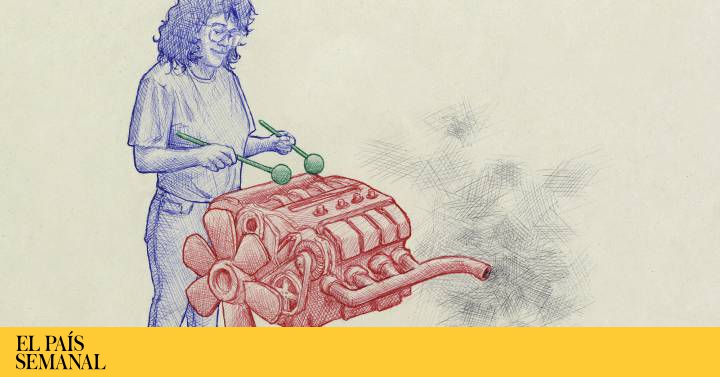Two years before the pandemic, the National Institute of Mental Health in the United States estimated that one in five residents suffered from anxiety.
If a similar study is done now, this rate would probably be even higher.
One of the first studies conducted in China, the site of the first coronavirus outbreak, found that a third of the population suffered from moderate to severe anxiety.
Uncertainty is now added to the sustained stress of contemporary life, which is a natural generator of fear and anguish.
The human being needs security and control.
Just what you can't have in the new normal.
Data and forecasts change day by day, and catastrophic news leaves us a more lasting mark than any ray of hope.
This context means that we are living in the age of anxiety.
And since there are no solutions from today to tomorrow, we will have to befriend this involuntary anticipatory response to danger, be it real or imagined.
Everyone has ever felt these symptoms: cold sweat, palpitations or throbbing in the heart, dizziness, feeling of suffocation.
Anxiety manifests itself in multiple ways to alert us to impending danger, so that we prepare for the threat.
But as worrisome as the current situation is, anxiety will not exactly help us face the challenges of an unstable and changing world.
In his book
Bye bye anxiety
, Ferran Cases, dedicated for two decades to the study of this physiological response, points out three levels at which we can work to rise to the peak of serenity:
Information.
An excess of
inputs
about what is happening and what else can happen fuels panic.
Limiting exposure to the news would be a first step.
In particular, before going to bed we should disconnect from the hustle and bustle of the world so as not to take worries to bed.
If we are too agitated, engaging in something pleasant will help us regain our center.
Habits
Although there are psychological profiles that are more prone to anxiety, some factors contribute to making it trigger more easily.
The most obvious would be the exciting ones.
The continuous consumption of coffees, teas, cola and energy drinks increases our state of tension.
Tobacco would further aggravate the cocktail.
An overly-tight schedule, coupled with a low-quality quick diet and sleeping less than seven to eight hours a day will end up unleashing the perfect storm.
In short: limiting excitements, managing time well, eating slowly and healthily and skimping on a night's rest is the best anti-anxiety formula.
A little soft sport would be the icing on the cake.
Self-knowledge.
It will help us, above all, not to succumb to panic when our internal alarm goes off.
At some point anxiety will make an appearance.
Many people are scared when they associate the mentioned symptoms with a serious health problem.
Knowing your own body, that is, detecting when we are anxious, will allow us to take measures to slow down and regain calm.
On the latter, human beings have a very powerful instrument to deactivate unjustified anxiety: breathing.
Most animals cannot change the way they breathe when they hyperventilate, but humans can.
And the technique is simple, although psychologists recommend applying it at the first signs of anxiety, when panic has not yet taken hold of us.
It consists of three steps:
Stop what we are doing.
Anxiety often appears in times of stress and acceleration, so to counteract it you have to pause.
If he catches us in the office and there is no other quiet place, a couple of minutes in the bathroom may do the trick.
Breathe slowly and deeply.
The opposite of hyperventilating is calm breathing, which starts slowly in the belly, swells the lungs, and finally lifts the clavicles.
It must be so soft that we cannot hear the air entering or leaving our nostrils.
After a few minutes, we will feel that the tension goes down or even leaves us completely.
Get back to your activity without rushing.
Do what you need to do calmly and, if anxiety returns to you, acknowledge it as an annoying visitor that will end up leaving.
Don't fight her.
Relativize what you're experiencing — you've been through this before — and let it go.
What Neuroscience Says
According to the neuroscientist Sara Teller, a researcher at the University of Barcelona, the last evolution of the human brain took place 100,000 years ago, when our species was still in the Paleolithic age and we lived by hunting and gathering.
Since then, especially in recent centuries, humanity's lifestyle has undergone such profound changes that our headquarters have not had time to adapt.
In us, the fight or flight mechanism that triggers anxiety continues to function.
Thanks to that we have overcome all kinds of dangers.
The current challenge is how to survive, in an overstimulated society, a constantly activated alarm without wild beasts or enemy tribes lurking.
Francesc Miralles is a writer and journalist specialized in psychology.

